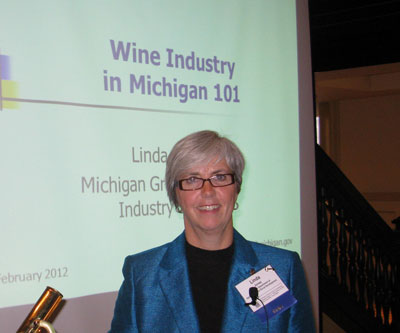TTB Approves Names of Midwest Varietals
Effective November 28, 2011, the Alcohol and Tobacco Tax and Trade Bureau approved the names of certain varietals as requested by various breeders, vineyards and wineries in the Midwest. Under the TTB ruling, these varietal names can now be used in designating wines so consumers can more readily ask for and read about them by name. The ruling also allows the use of the new varietal names on wine bottles and advertisements.
Brianna– Petitioned by Aquaviva Winery, Batavia, IL. A white hybrid developed by Elmer Swenson. Aquaviva planted 429 Brianna vines in ‘o6 and produced its first wine from Brianna grapes in 2008.
Cabernet Diane– Petitioned by Lucian Dressel of Davis Viticultural Research, Carrollton, IL. This variety is bred by Mr. Dressel, and according to the TTB petition, is grown by 7 growers in 6 states. Mary Michelle Winery in Carrollton, IL has made wine from Cabernet Diane since 2006.
Cabernet Dore– Petitioned by Lucian Dressel of Davis Viticultural Research, Carrollton, IL. Another varietal bred by Mr. Dressel that is also grown in multiple states and used to make wine by Mary Michelle Winery.
Crimson Cabernet– Petitioned by Lucian Dressel of Davis Viticultural Research, Carrollton, IL. According to Mr. Dressel, 16 growers in 11 states grow Crimson Cabernet and Mary Michelle Winery uses it to make wine and has done so since 2006.
Frontenac– Petitioned by Peter Hemstad, Research Viticulturalist at the University of Minnesota. In his petition, Hemstad noted a Minnesota Grape Growers Association 2000 Census that found over 10,000 Frontenac vines growing in Minnesota alone. The petition also included letters from growers in Indiana and Iowa.
Frontenac Gris– Petitioned by Peter Hemstad, Research Viticulturalist at the University of Minnesota. First grown in the University’s experimental vineyard in ’92. Eleven nurseries in 6 states are now licensed to propagate Frontenac Gris.
La Crescent– Petitioned by Peter Hemstad, Research Viticulturalist at the University of Minnesota. Another hybrid developed by Minnesota’s grape breeding program. Now in production by many Midwest wineries.
Louise Swenson– Petitioned by The Minnesota Grape Growers Association. Developed by Elmer Swenson. MGGA said this varietal is cold hardy to -40 and is grown in several upper Midwest states and New York.
Marquette– Petitioned by Peter Hemstad, Research Viticulturalist at the University of Minnesota. Hemstad told TTB that 125,776 vines were sold from 2006-2008. Now widely planted in the Midwest including Minnesota, Iowa and Illinois. Most popular vine to be planted in Wisconsin during past three years. Praised for unique tannic structure.
Prairie Star– Petitioned by The Minnesota Grape Growers Association. Developed by Elmer Swenson. Petition included letters from four Minnesota growers and wineries having success with Prairie Star, a white hybrid varietal.
Reliance– Petitioned by OOVVDA Winery in Springfield, MO. Developed at the University of Arkansas in 1984. OOVVDA starting making Reliance, a red cross of Ontario and Suffolk Red, in 2006. Reliance vines are commercially available in Arkansas and New York.
Sabrevois– Petitioned by The Minnesota Grape Growers Association. Developed by Elmer Swenson. Petition included letters from four Minnesota growers and wineries having success with Sabrevois, a red hybrid varietal.
St. Pepin– Petitioned by The Minnesota Grape Growers Association. Developed by Elmer Swenson. St. Pepin, a white hybrid varietal, has been planted since at least 1991 and is now widely grown in Wisconsin, Minnesota and other Midwestern states.
Zinthiana– Petitioned by Lucian Dressel of Davis Viticultural Research, Carrollton, IL. A cross of Zinfandel and Norton created in 2000. Mr. Dressel has trademarked the name. Mary Michelle Winery makes wine from Zinthiana and the petitioner said two other wineries are in the process of producing the newly approved varietal.
Finally, Valvin Muscat, a grape that is increasing in production in the Midwest, was also approved by TTB. Dr. Bruce Reisch of Cornell University was the petitioner. In the petition, Dr. Reisch mentioned Indiana as a state producing Valvin Muscat.



